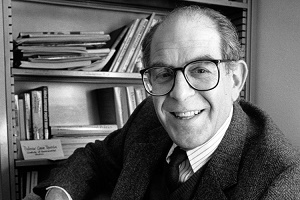
Gene I. Rochlin
Professor of Energy and Resources, Emeritus
Gene Rochlin died of complications from a stroke on November 25, 2018 at Highland Hospital in Oakland at the age of 80.
Rochlin was born in Chicago, Illinois, on May 3, 1938. He obtained three degrees in physics from the University of Chicago: a B.A. in 1960, an M.S. in 1961, and a Ph.D. in 1966. Upon completing his Ph.D., he was hired as an assistant professor at UC Berkeley, where he stayed for eight years. He made the unconventional choice to re-train in political science as an advanced post-doctoral scholar at MIT and Harvard in 1974 and 1975, and he returned to UC Berkeley and joined the faculty of the fledgling graduate group in energy and resources. He retired from the Energy and Resources Group (ERG) in 2005, having played a critical role in establishing its reputation for excellence in interdisciplinary research and education, training several generations of students, and facilitating the career transitions of a cadre of exceedingly grateful, loyal, and appreciative students and post-doctoral fellows.
His research interests were expansive and included science, technology and society; cultural and cognitive studies of technical operations; the politics and policy of energy and environmental matters; and the broader cultural, organizational and social implications and consequences of technology, including large technical systems. He was a principal of the Berkeley High Reliability Project, a multidisciplinary team that studied the organizational aspects of safety-critical systems such as nuclear power and air traffic control, and he also continued to work on the management, regulation and control of large, complex, high-technology organizations performing socially critical functions as an independent scholar. This extended to studies that sought to apply methods, approaches, and theories from a broad spectrum of the humanities and social sciences to issues arising from the vulnerability of complex, sophisticated technologies and technical systems, particularly the global threats arising from human networks as well as natural phenomena.
Professor Rochlin was a co-founder of the international Large Technical Systems project, and a co-principal of a multi-disciplinary team that also studied the organizational and cultural dimensions of operational reliability of safety-critical systems such as nuclear power, aircraft carrier operations, and air traffic control. In 1990, he published a report analyzing the 1988 accidental shooting of an Iranian passenger plane by the billion-dollar technological marvel, the battleship USS Vincennes. His report concluded that over-reliance on the sophisticated technology directly led to the tragedy. This research also led him to identify problems with many of the computerized weapon systems for missiles and jets used during the 1991 Gulf War in Iraq.
Rochlin invited students and colleagues to think critically about technology; his research told the story of how dangerous it can be to have an overly confident technocratic perspective on systems that are key to our society, but are only understood when a thoughtful combination of technical, social and community lessons and interactions are brought equally to the table.
Rochlin held a Guggenheim Fellowship, was a scholar-in-residence at the Rockefeller Foundation Bellagio Study Center, was a Fellow of the American Physical Society, and served on the editorial board of several journals.
Along with his many publications, his books, Scientific Technology and Social Change (1974), Plutonium, Power, and Politics (1979), and Trapped in the Net: The Unanticipated Consequences of Computerization (1997) explored the high profile and the more nuanced aspects of science and society. Trapped in the Net, which focused on the vulnerability of organizations and institutions in an earlier phase of global technical integration, won the 1999 Don K. Price Award of the Science, Technology and Environmental Politics Section of the American Political Science Association.
Gene Rochlin was a wise, kind, and fun teacher and mentor to generations of ERG and UC Berkeley students. He was an incredibly vibrant and integral part of ERG. His capacious research interests and transition from physics to the social and political study of science, complexity, and engineered systems made him a perfect fit with the highly interdisciplinary ERG. He also facilitated dialog across campus between science, engineering and social science and the humanities with wit and great humor. Even in retirement, Rochlin continued to play a core and inspiring role in ERG, and he led seminars and participated in classes taught by his colleagues up until the week before his passing.
Gene Rochlin was married for 43 years to Anne Middleton, the Florence Green Bixby Professor Emerita of English at UC Berkeley, who passed away in 2016. They formed a close and powerful team since meeting at UC Berkeley in the 1960s and marrying in 1973. Together they dedicated themselves to improving the University, creating scholarly communities, and mentoring students.
Rochlin is survived by his sister, Ethel Rochlin, sons Stephen Rochlin and David Rochlin and their wives, and four grandchildren.
Daniel M. Kammen
2021
Photo credit: Peg Skorpinski
